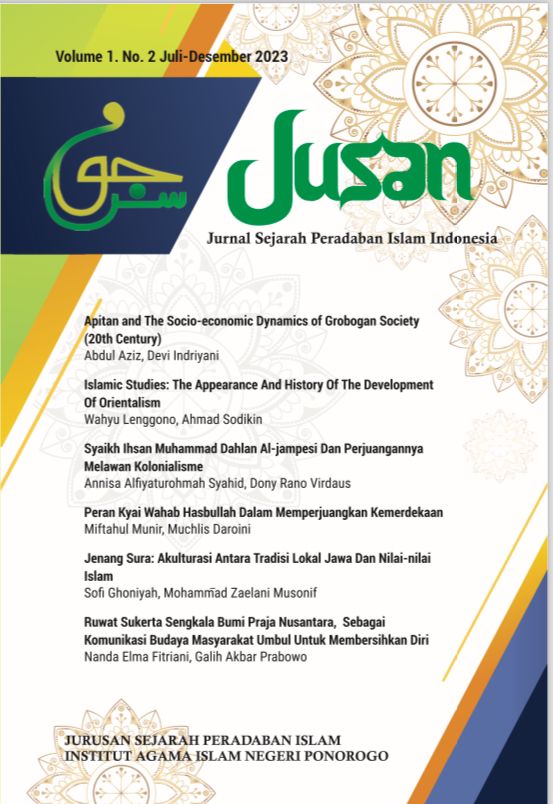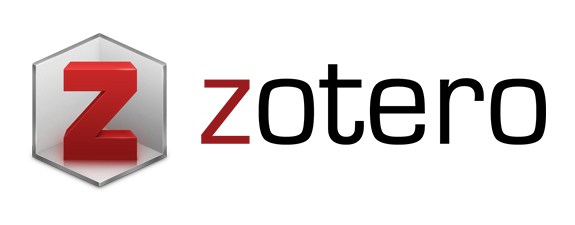APITAN AND THE SOCIO-ECONOMIC DYNAMICS OF GROBOGAN SOCIETY (20TH CENTURY)
Abstract
Apitan, a longstanding tradition in Grobogan, Central Java, holds its roots in the Hindu-Buddhist era. This cultural practice has significantly shaped and transformed the socio-economic and religious landscape of the community, making it imperative to investigate how Apitan has influenced the social, economic, and religious dynamics of Grobogan in the 20th century. This research employs a historical approach with a social perspective. The findings of this study reveal that Apitan bestows numerous benefits upon the Grobogan community. Notably, it fosters camaraderie not only among fellow Muslims but also between individuals of different faiths. Furthermore, this tradition serves as a means of disseminating historical insights, perpetuated through community rituals. From a socio-economic standpoint, it has evolved over time, primarily functioning as a platform for the promotion and introduction of halal food and a halal lifestyle. In the pre-independence era, marked by challenging circumstances and limited education, the accessibility of non-halal food forced the populace to consume it. Although Apitan continues to be celebrated annually, local traditions face significant challenges in the modern global era. The younger generation is progressively less engaged and interested in the Apitan tradition. This predicament necessitates a multi-faceted approach, addressing both the challenges of the times and finding solutions to preserve the local Muslim community's traditions.References
Abdurrahman, D. (2011). Metodologi Penelitian Sejarah Islam. Yogyakarta: Ombak.
Al, M. Y. (2005). Islam dan Budaya Lokal. Yogyakarta: Teras.
Aslan, Suhari, Antoni, M. Ali Mauludi, Galuh Nashrulloh Kartika MR. (2020).
Dinamika Keagamaan Masyarakat Perbatasan Paloh. Jurnal Antropologi, 90
- 101.
Cahyandari, A. G. (2012). "Tradisi Apitan pada Masyarakat Dusun Jojogan, Kecamatan
Watukumpul, Pemalang”“Jawa Tengah."
Dahlia, H. (2018). Tinjauan Hukum Islam Tentang Tradisi Urup (Study Kasus Di
Kabupaten Grobogan). eprint.walisongo.ac.id.
Faridatussyifa. (2021, January Selasa). Sejarah Apitan dan Dinamika Sosial
Keagamaan Di Grobogan Abad 20. (D. Indriyani, Interviewer).
George Ritzer, Goodman J Doglas. (2004). Teori Sosiologis Modern. Jakarta: Prenada.
Grobogan, B. (2016). Statistik Daerah Kecamatan Tegowanu. Grobogan: BPS
Grobogan.
Khulud, L. (1988). Islamisasi Pada Masa Pemerintahan Sultan Agung. Jurnal
Penelitian Agama .
pigeaud, T. G. (n.d.). Java in the 14 th century. The netherlands institude for
international cultural relations.
Raharjo, T. (2021, Januari Senin). Sejarah Apitan Dan Dinamika Sosial Keagamaan
Di Grobogan Abad 20. (D. Indriyani, Interviewer)
Ricklefs, M. C. (1964). Mystic synthesisi in Java ( ahistory of islamization the
fourteent to nineteent century). The Free Press 1964.
Sarwi. (2021, Februari Senin). Sejarah Apitan dan Dinamika Sosial Keagamaan Di
Grobogan Abad 20. (D. Indriyani, Interviewer).
Slamet, Muljana. (1977). Runtuhnya Kerajaan Hindu Jawa dan Munculnya Negara -
Negara Islam di Nusantara. Jakarta: Bhratara.
Sugeng. (2021, Januari Minggu). Sejarah Apitan dan Dinamika Sosial Keagamaan Di
Grobogan Abad 20. (D. Indriyani, Interviewer)
Suyudi. (2021, Februari Senin). Sejarah Apitan dan Dinamika Sosial Keagamaan Di
Grobogan Abad 20. (D. Indriyani, Interviewer)
Usamah. (2019). Transformasi Islam dari Demak Hingga Mataram. Surabaya:
Universitas Islam Negeri Sunan Ampel.
Widiana, N. (2015). Akulturasi Islam dan Budaya Lokal Dalam Tradisi Nyumpet Di
Desa Sekuro Kecamatan Mlonggo Kabupaten Jepara. Jurnal Ilmu Dakwah,
-294.
Zoetmuler. (1990). Manunggaling Kawula Gusti: Pantheisme dan Monisme dalam
Sastra Suluk Jawa. Jakarta: Gramedia Pustaka Utama.











